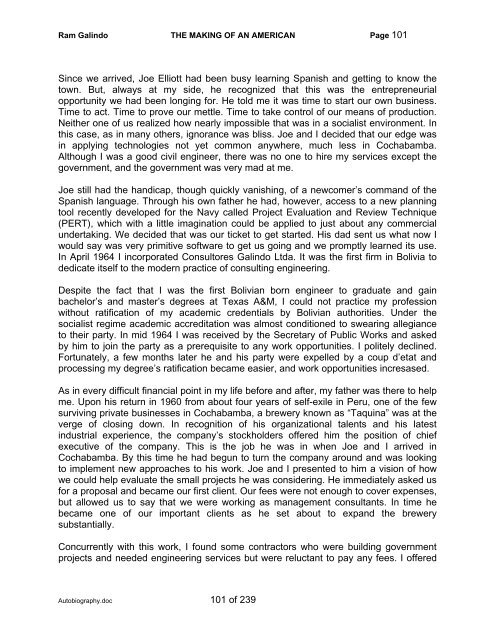Autobiography - The Galindo Group
Autobiography - The Galindo Group
Autobiography - The Galindo Group
Create successful ePaper yourself
Turn your PDF publications into a flip-book with our unique Google optimized e-Paper software.
Ram <strong>Galindo</strong> THE MAKING OF AN AMERICAN Page 101<br />
Since we arrived, Joe Elliott had been busy learning Spanish and getting to know the<br />
town. But, always at my side, he recognized that this was the entrepreneurial<br />
opportunity we had been longing for. He told me it was time to start our own business.<br />
Time to act. Time to prove our mettle. Time to take control of our means of production.<br />
Neither one of us realized how nearly impossible that was in a socialist environment. In<br />
this case, as in many others, ignorance was bliss. Joe and I decided that our edge was<br />
in applying technologies not yet common anywhere, much less in Cochabamba.<br />
Although I was a good civil engineer, there was no one to hire my services except the<br />
government, and the government was very mad at me.<br />
Joe still had the handicap, though quickly vanishing, of a newcomer’s command of the<br />
Spanish language. Through his own father he had, however, access to a new planning<br />
tool recently developed for the Navy called Project Evaluation and Review Technique<br />
(PERT), which with a little imagination could be applied to just about any commercial<br />
undertaking. We decided that was our ticket to get started. His dad sent us what now I<br />
would say was very primitive software to get us going and we promptly learned its use.<br />
In April 1964 I incorporated Consultores <strong>Galindo</strong> Ltda. It was the first firm in Bolivia to<br />
dedicate itself to the modern practice of consulting engineering.<br />
Despite the fact that I was the first Bolivian born engineer to graduate and gain<br />
bachelor’s and master’s degrees at Texas A&M, I could not practice my profession<br />
without ratification of my academic credentials by Bolivian authorities. Under the<br />
socialist regime academic accreditation was almost conditioned to swearing allegiance<br />
to their party. In mid 1964 I was received by the Secretary of Public Works and asked<br />
by him to join the party as a prerequisite to any work opportunities. I politely declined.<br />
Fortunately, a few months later he and his party were expelled by a coup d’etat and<br />
processing my degree’s ratification became easier, and work opportunities incresased.<br />
As in every difficult financial point in my life before and after, my father was there to help<br />
me. Upon his return in 1960 from about four years of self-exile in Peru, one of the few<br />
surviving private businesses in Cochabamba, a brewery known as “Taquina” was at the<br />
verge of closing down. In recognition of his organizational talents and his latest<br />
industrial experience, the company’s stockholders offered him the position of chief<br />
executive of the company. This is the job he was in when Joe and I arrived in<br />
Cochabamba. By this time he had begun to turn the company around and was looking<br />
to implement new approaches to his work. Joe and I presented to him a vision of how<br />
we could help evaluate the small projects he was considering. He immediately asked us<br />
for a proposal and became our first client. Our fees were not enough to cover expenses,<br />
but allowed us to say that we were working as management consultants. In time he<br />
became one of our important clients as he set about to expand the brewery<br />
substantially.<br />
Concurrently with this work, I found some contractors who were building government<br />
projects and needed engineering services but were reluctant to pay any fees. I offered<br />
<strong>Autobiography</strong>.doc 101 of 239


